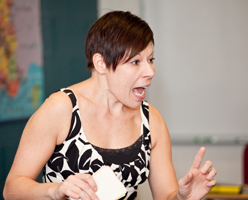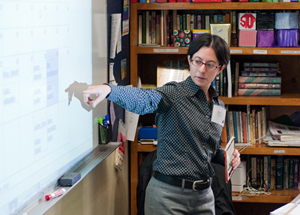“Language is life,” says French teacher Sue Michalski, “and I believe that language in the classroom should be alive as well.” With that goal in mind, all of her French classes, from French I through AP French, are conducted entirely in French. She notes that many of her students speak to her in French even outside of class, and says that in some cases, “I have never heard their voices in English.” Michalski graduated with highest departmental honors from Dartmouth College and taught French at Dartmouth with John Rassias and at the Walnut Hill School before coming to Williston in 1999.
 |
| Sue Michalski brings high energy to her students |
In order to help her students learn intensely and wholeheartedly, Michalski incorporates music into various projects throughout the French curriculum. “Music is key for memory and repetition,” she points out. “A great song is fun, and gets into your head. The grammar also gets in there, often without the students realizing it.” Her AP French students still sing the “silly” yet usefully songs they learned in earlier classes.
Michalski’s French IV: Conversation class recently produced music videos for popular songs through which they had learned important grammar points. The requirements of the project were to memorize the song, show all students singing equally, and visually represent an understanding of the song’s message. Following the submission of the students’ music videos, the class then watched the musician’s video and compared the two approaches.
The song in the video below (read the lyrics and translation) is about what the singers would do if they were to die tomorrow: the refrain answers the question with, “I would love you.” Michalski points out that studying popular songs also gives a glimpse of Francophone culture (this song is sung by a Frenchman, Pascal Obispo, and a Canadian woman, Natasha St. Pierre). The students who produced this video are Nick Halbach ’11, Addison Morse ’12, Vicky Vazquez ’11, and Sarah Wilkie ’12.
In another musical project, the students wrote their own songs. They were required to include a certain number of grammar points and vocabulary words, to have stanzas and a refrain, and then to set the words to music. “Writing a song has students playing with language, incorporating vocabulary and structures we have studied, and using technology,” Michalski says. “Creating a tangible final project, ‘their’ song, is a great reward as well.”
One group (Debbie Andres ’11, Vicky Vazquez, and Sarah Wilkie) wrote a song called “Jour” (Day) to the music of Prince’s “Kiss.” Read the lyrics or listen to the song (left click to play or right click to download their song). Here is an excerpt of the refrain:
Il ne faut pas avoir de la veine
Il ne faut pas avoir tout comme une reine…
Vis pour le prochain…jour |
You don’t have to be lucky
You don’t have to have everything like a queen…
Live for the next…day. |
Michalski is happy to say that her students “love trying new and fun things,” and she uses this positive energy to help them progress toward fluency in French. She says, “Seeing them do something they never thought they could do, but I always knew they could—it’s a beautiful thing.”
Dr. Michael Lesy will give a lecture at The Williston Northampton School’ for the Photographers’ Lecture Series in the Dodge Room of the Reed Campus Center on April 1, 2011, at 6:30 p.m.



